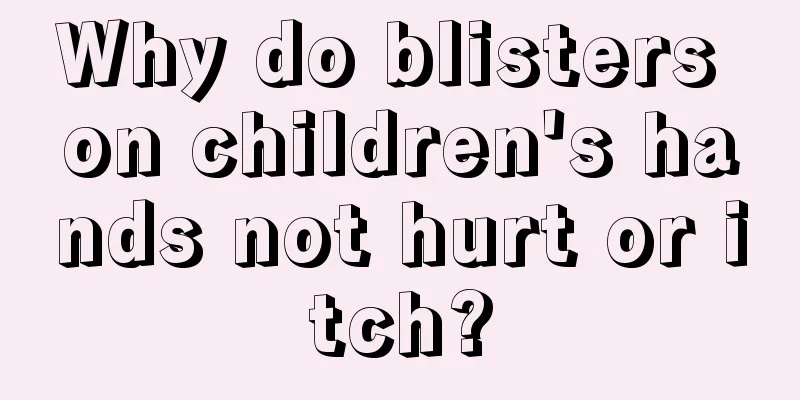What should I do if my child drools?

|
In daily life, many children drool. There are many reasons for children drooling, some of which are caused by oral diseases. Oral inflammation or oral ulcers can easily cause drooling. Children who drool frequently can clean their mouths properly and pay attention to oral hygiene. How to take care of a baby who drools? 1. To prevent saliva from wetting the clothes in front of the neck and upper chest, you can put a small cotton bib on your baby. Soft, slightly thick and highly absorbent fabrics are the first choice for bibs. 2. Saliva contains some miscellaneous bacteria and amylase and other substances in the oral cavity, which have a certain irritating effect on the skin. If you do not take good care of it, the skin around the mouth will turn red and small red papules will appear. At this time, you need to apply some baby skin care cream. 3. When the baby's deciduous teeth are erupting, the gums will itch, become swollen and painful, and the baby will drool more. You can give the baby chewing gums of appropriate hardness or chewing teeth biscuits for babies over 6 months old. This can reduce the discomfort of the gums during teething, stimulate the deciduous teeth to erupt as soon as possible, and reduce drooling. 4. When the baby drools a lot, the mother should pay attention to taking care of the skin around the baby's mouth and wash it with clean water at least twice a day. Keep your baby's face and neck dry to avoid eczema. 5. Do not wipe the baby's mouth with a rough handkerchief or towel as this may easily damage the skin. Use a very soft handkerchief or napkin to wipe away the saliva outside your mouth little by little to keep the area around it dry. 6. If the skin has rash or erosion, it is best to go to the hospital for diagnosis and treatment. During skin inflammation, the skin should be kept clean and fresh, and treatment should be sought according to symptoms. If antibiotics or antipruritic ointments need to be applied locally, it is best to do so before the baby goes to bed or while the baby is sleeping to prevent the baby from accidentally ingesting them and affecting their health. Special reminder: Drooling is more obvious during the teething period of infants. During this period, the mouth is an important organ for infants to obtain satisfaction. Increased saliva will reduce the pain of gums. Increased saliva is a physiological phenomenon, not a disease. There is no need for treatment. Just pay attention to care. The drooling condition will improve as the baby grows older, his swallowing ability and lip closure ability improve, his teeth gradually sprout, and the volume and depth of his oral cavity gradually increase. Mothers do not need to worry too much. However, if your baby still drools when he is 2 to 3 years old and all his teeth have grown, you should be careful that your baby may have diseases such as oral and pharyngeal mucosal inflammation, and you need to go to the hospital for examination and treatment. Abnormal drooling in babies When children have a cold, a stuffy nose, or difficulty breathing, they often breathe through their mouths, and saliva will flow out from the corners of their mouths. If blisters appear on your baby's lips, corners of mouth, or around his mouth, it means that your baby may have ulcers in his mouth and may have stomatitis. Maxillofacial trauma, oral mucosal damage, ulceration, inflammation or tooth decay and other lesions can stimulate the salivary glands to increase secretion and cause drooling. Some also contain yellow or light red mucus and have a foul odor. In this case, you should go to the dental department for diagnosis and treatment. |
<<: What should I do if my child has a nosebleed?
>>: What are some ways to supplement calcium for children?
Recommend
What toothbrush is good for children?
Washing our face and brushing our teeth are thing...
What is the cause of the child's stomach gurgling and farting?
Given that children's digestive abilities are...
What medicine should children take for nausea and vomiting?
For children, vomiting is a relatively normal phe...
What are the symptoms of small intestinal hernia in babies
Intestinal hernia in infants is relatively common...
How to prevent dental calculus in two-year-old babies
Children in many families brush their teeth late,...
At what age do children develop breasts?
What women care about most is whether they have a...
How to deal with eye discharge in children, mothers need to read
If a child has eye mucus, mothers should pay atte...
Children get tired easily
Our body needs certain nutrients on a daily basis...
What to do if baby has stuffy nose when using air conditioner_ What to do if baby has stuffy nose when using air conditioner
It is very common to use air conditioning in the ...
What causes white tongue in children?
Everyone is very concerned about children’s disea...
What should I do if my child's throat is a little red?
Children's immunity is very low, and because ...
Baby's forehead is hot and his hands and feet are cold
If you find that your baby has a hot forehead and...
Why does my child keep sneezing?
There are many reasons why children always sneeze...
What to do if your newborn baby has red blood streaks on his face
If some children suffer from diseases, it will se...
Red pimples on the child's buttocks
The baby's skin is delicate, and the newborn ...









